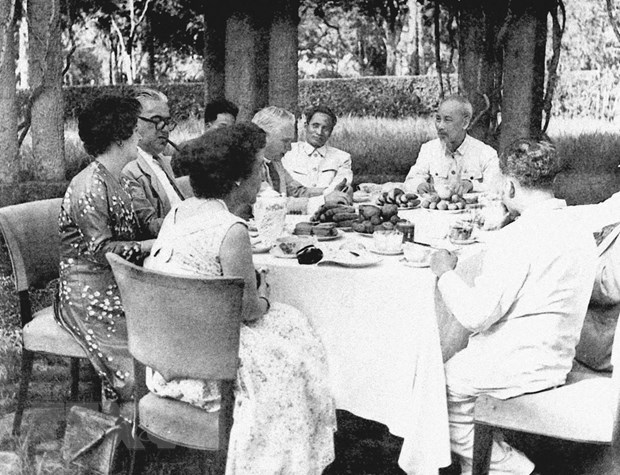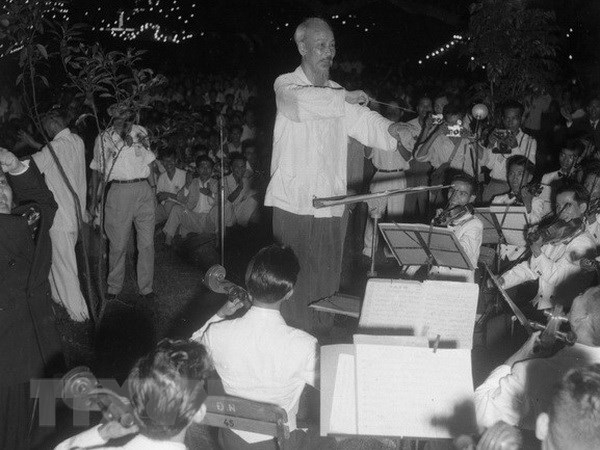 Society
Society

 |
| President Hồ Chí Minh meets with the British Parliamentary Delegation during their visit to Việt Nam in May 4, 1957.— VNA/VNS File Photo |
HÀ NỘI — President Hồ Chí Minh, born on May 19, 1890, was not only an outstanding leader, a beloved comrade, a teacher, and a close friend in the hearts of every Vietnamese person, but also a great and humble man with the erudite wisdom, far-reaching vision, and noble ambitions "giving everything for the fatherland, for the people” in the eyes of international friends.
Major General Đinh Quốc Hùng - Political Commissar of the Hồ Chí Minh Mausoleum Protection Command said the life and career of President Hồ Chí Minh (Uncle Hồ) is a shining example of patriotism and great encouragement for generations of Vietnamese.
Trần Viết Hoàn, a bodyguard of President Hồ Chí Minh during 1966-1969 and former Director of Uncle Hồ's relic site, said: “Uncle Hồ passed more than 50 years ago, but on the occasion of his birthday in May every year, Vietnamese people miss him very much.
“Uncle Hồ was a great leader but very simple, close, sincere and always cared for everyone around him.”
At that time they knew each other, Hoàn said Uncle Hồ’s meal would often only be a bowl of vegetable soup and some cà pháo (salted egg plants). Sometimes, there were also slices of braised meat or fish.
Uncle Hồ often asked the kitchen to mix the rice with cassava roots to save rice like everyone else did while the country was very poor. Every Saturday for dinner Uncle Hồ only ate porridge, Hoàn said.
He did this, Hoàn said, to be able to save the rice and give it to the poor.
Chile’s late President Salvador Guillermo Allende Gossens said behind President Hồ Chí Minh’s soft look is a strong, brave and indomitable spirit.
“At first Westerners just laughed at his clothes, then many people realised that his special clothes prove that no matter where, among the elite or among the masses, he never forgets that he is one of the people of his beloved country,” Salvador said.
“If anyone wants to find words that can sum up all of President Hồ Chí Minh’s life, simplicity and humility.”
Blaga Nikolova Dimitrova, a Bulgaria's female poet, wrote in her work: "An hour with Comrade Hồ Chí Minh" that "Hope has many different names, but in Việt Nam, hope is symbolised by President Hồ Chí Minh."
Honorary late President of the World Peace Council (WPC) Romesh Chandra said: “Wherever there is fighting for independence and freedom, there is Hồ Chí Minh and the flag of Hồ Chí Minh flies high.”
In November 2013, Russian President Vladimir Putin paid an official visit to Việt Nam and visited President Hồ Chí Minh's residence. Putin wrote in the visitor’s book that: "Humanity has entered the 21st century, a century of peace, progress and prosperity. But Hồ Chí Minh's ideological and moral values are believed to be a torch, a symbol of a future culture. So, history will forever refer to him as a saint.”
Symbol of peaceful diplomacy, culture
 |
| President Hồ Chí Minh sings the song "Unity" at an event to welcome the third National Party Congress, September 1960 in Hà Nội.— VNA/VNS Photo Lâm Hồng Phong |
In 1919, the first time he appeared on the political arena sending his eight-point demand to the Versailles Conference, President Hồ Chí Minh expressed his desire to fight for the freedom and equality of the nation by peaceful means.
During the later stages, President Hồ Chí Minh always expressed the idea of peace and aspirations for peace.
Facing the risk of the outbreak of the Việt Nam-France war, on July 12, 1946, in Paris, Uncle Hồ declared: "We don't want to push the French out of Việt Nam… Việt Nam needs France. France also needs Việt Nam. Only mutual trust, honest and equal cooperation can lead to friendly results between the two countries.”
While later fighting the United States, Uncle Hồ maintained: ''Please believe me when I say that I will be very happy to welcome the US President to come here peacefully. We extend a hand of friendship to any country that recognises Việt Nam as a free and independent country."
Right after independence, the first communiqué on foreign policy of the Government of the Democratic Republic of Việt Nam dated October 3, 1945, set out the goal of contributing to world peace.
The statement said: "The Democratic Republic of Việt Nam earnestly wishes to maintain friendship and sincerely cooperate on the basis of equality and mutual assistance to build lasting world peace."
After signing a temporary treaty on September 14, 1946 with the French Government, President Hồ Chí Minh told the Paris- Sài Gòn newspaper: "My compatriots and I sincerely want peace. We don't want war."
In 1955, Uncle Hồ said: “The Vietnamese people firmly believe that all disputes in the world can be resolved by peaceful means, firmly believe that despite different social systems and different forms of consciousness, all countries can live together in peace."
Uncle Hồ's thoughts on peace and friendly cooperation for development, is a great thought with timeless vitality because it contains the eternal values of humanity.
That thought has suggested a way to approach and solve the problems of the contemporary world, just as Indian Late Prime Minister Jawaharlal Nehru said: “The world today is going through a crisis. What we need now is to approach peace and friendship. Hồ Chí Minh is emblematic of that approach."
 |
| Hồ Chí Minh Square in Moscow, Russia.—VNA/VNS Photo Trần Hiếu |
Uncle Hồ’s footprints all over the world
Time flies, the darkness of war has also passed, but President Hồ Chí Minh's footprints have remained in many places around the world where he visited during his life of revolutionary activities, finding the way to liberate the nation.
There are 29 statues and monuments and 11 memorial areas dedicated to Uncle Hồ around the world. Twenty roads, avenues and many schools are also named after the former President.
In France, there are about 45 relic sites that store many precious documents and artifacts related to Uncle Hồ's revolutionary career from 1911 to 1927. The most notable is House No. 9 on Compoint Alley, in District 17, where President Hồ Chí Minh lived and worked from 1921 to 1923 during his journey to search ways for national salvation.
In Moscow, Russia, there is a very special square named after the great leader of the Vietnamese nation - Hồ Chí Minh Square. Here there is a monument of President Hồ Chí Minh, which has been a popular place for public gathering of Vietnamese people on special occasions. The monument was inaugurated on May 18, 1990 on the occasion of President Hồ Chí Minh’s 100th birth anniversary.
In the city of Saint Petersburg, Saint Petersburg University established the Hồ Chí Minh Academy, which has conducted in-depth research on Vietnamese history and culture.
The talent and noble personality of President Hồ Chí Minh is also the inspiration of many world writers and artists. There have been many films and songs written by foreign authors about him, including the song "The ballad of Hồ Chí Minh" by British musician Ewan MacColl. The song has been translated into many languages and become familiar in international events about Uncle Hồ.
“Far away across the ocean,
Far beyond the seas eastern rim,
Lives a man who is father of the Indo-Chinese people,
And his name it is Hồ Chí Minh.
Hồ, Hồ, Hồ Chí Minh.
Hồ, Hồ, Hồ Chí Minh …..” — VNS
President Hồ Chí Minh’s biography
Hồ Chí Minh (alias Nguyễn Sinh Cung, Nguyễn Tất Thành, and Nguyễn Ái Quốc), was born on May 19, 1890 in Kim Liên Village, Nam Đàn District, Nghệ An Province.His father was a patriotic scholar; his mother was a farmer. His older sister and brother both took part in the anti-French movements and were imprisoned by the colonial administration.On June 3, 1911, Hồ Chí Minh left the country. He lived by doing many different jobs. He also participated in the revolutionary movements of many peoples while making great efforts to struggle for his nation’s independence and freedom.In 1941, he returned Việt Nam, convening the 8th Conference of the Central Committee of the Indochina Communist Party, deciding the way for national salvation, establishing the League for Independence of Việt Nam, building armed forces and revolutionary bases, leading the people to launch the uprisings and prepare the general insurrection to seize power throughout the country.After the August 1945 Revolution, on September 2, 1945, at Ba Đình Square, President Hồ Chí Minh read the Declaration of Independence to establish the Democratic Republic of Việt Nam; organised the free nation-wide general election to select the National Assembly and approved the first democratic Constitution of Việt Nam. The First National Assembly appointed Hồ Chí Minh as the President of the Democratic Republic of Việt Nam (1946).On December 13, 1946, he gave the appeal to wage the anti-French resistance war for the sake of national independence and freedom. Under the leadership of the Central Party Committee, headed by President Hồ Chí Minh, the Việt Nam’s resistance war won a resounding victory at Điện Biên Phủ (1954).After the Northern part of Việt Nam was liberated (1955), the Party Central Committee and President Hồ Chí Minh put forward the two strategic tasks for the Vietnamese revolution: carrying out the socialist revolution and building socialism in the North; and struggling to liberate the South and reunify the country, fulfilling the people’s national democratic revolution in the whole country. — VNS




